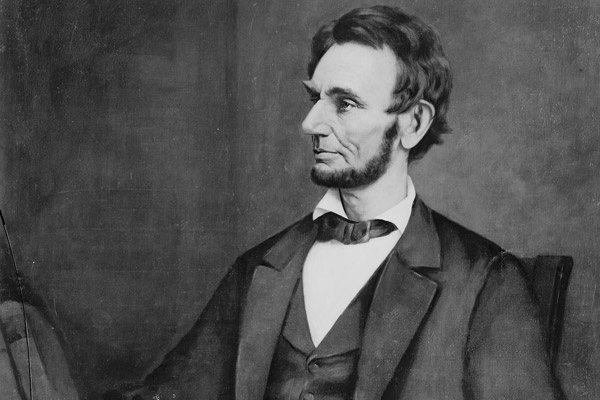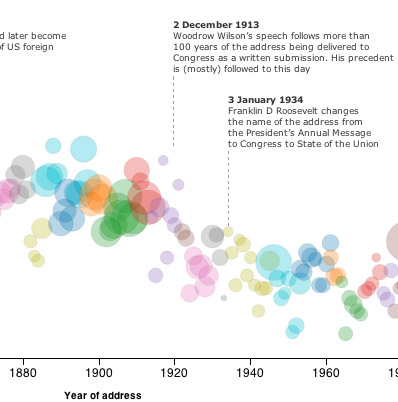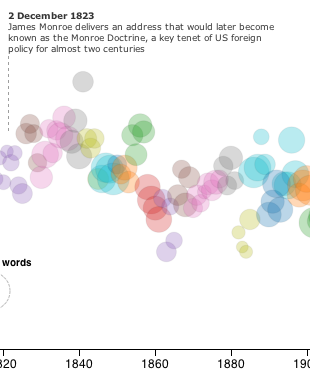
In advance of the president's State of the Union address, a visualization from the Guardian has been making the rounds on the "complexity" of the address over the years, entitled "The State of Our Union Is… Dumber." It's based on a Flesch-Kincaid analysis, which my version of WordPerfect had back in the day, and which taught me bad habits that my teachers had to break me of, namely regarding sentence length and the use of five-dollar words. Also, Flesch-Kincaid is… kind of dumb. But even spotting them Flesch-Kincaid, it's kind of silly.

State of the Union addresses were much more "complex" in the 1800s (they weren't called that then); then there was a substantial drop in the early 20th century. The infographic provides a little hint as to why—prior to the early 20th century, SotUs weren't speeches. They were written reports. And they had a narrow audience and a specific purpose: "In the 19th century, the annual message was both a lengthy administrative report on the various departments of the executive branch and a budget and economic message."
If you go back and look at the addresses given by Polk, or Arthur, or Buchanan, or Johnson, or basically all the 19th-century presidents, long passages of the reports are given to recounting specific information on accounts and infrastructure—the expansion of the postal office's miles, the number of ships in the Navy, money going to pensions, the taxes collected on fermented liquors as compared to tobacco and distilled spirits. The specific machinations, minor and major, of foreign policy were discussed at length.
Woodrow Wilson reintroduced the practice of delivering the address as a speech, which had not been done since Jefferson (the reasoning is kind of interesting):
A seemingly well-established misconception found even in some academic literature, is that the State of the Union is an orally delivered message presented to a joint session of Congress. With only a few exceptions, this has been true in the modern era (ca. 1933-present, see Neustadt or Greenstein), but beginning with Jefferson's 1st State of the Union (1801) and lasting until Taft's final message (1912), the State of the Union was a written (and often lengthy) report sent to Congress. Although Federalists Washington and Adams had personally addressed the Congress, Jefferson was concerned that the practice of appearing before the representatives of the people was too similar to the British monarch's ritual of addressing the opening of each new Parliament with a list of policy mandates, rather than "recommendations." This changed in 1913. Wilson believed the presidency was more than a impersonal institution; that instead the presidency is dynamic, alive, and personal (see Tulis).
Writing for oral delivery is just different, something I learned the hard way when I took public speaking in college, and was told I was reading essays aloud, not giving speeches.
But another change took place after Wilson: the first radio broadcast of the Message, a decade afterwards, by Calvin Coolidge in 1923. It had the lowest Flesch-Kincaid score to that date, and Coolidge's staccato rhythm comes through in the text:
Our main problems are domestic problems. Financial stability is the first requisite of sound government. We can not escape the effect of world conditions. We can not avoid the inevitable results of the economic disorders which have reached all nations. But we shall diminish their harm to us in proportion as we continue to restore our Government finances to a secure and endurable position. This we can and must do. Upon that firm foundation rests the only hope of progress and prosperity. From that source must come relief for the people.
Compare this to William Howard Taft's final Message, part of which addresses the "Fur Seal Treaty and Need for Amendment of our Statute":
The act adopted at the last session of Congress to give effect to the fur-seal convention Of July 7, 1911, between Great Britain, Japan, Russia, and the United States provided for the suspension of all land killing of seals on the Pribilof Islands for a period of five years, and an objection has now been presented to this provision by the other parties in interest, which raises the issue as to whether or not this prohibition of land killing is inconsistent with the spirit, if not the letter, of the treaty stipulations.
That's the first sentence of that section. The next couple, in fairness, are shorter.
Different audiences; different technologies; different rhetoric. As the American Presidency Project's Gerhard Peters writes, "Any research design should recognize these facts." (After Coolidge's radio address, he and his successors returned to the written address; the tradition of the State of the Union as a speech really begins with Roosevelt.)
There's also a little "dumb" outlier earlier.

That purple dot there at the bottom is Abraham Lincoln's second Annual Message to Congress, which Ted Widmer explains (emphasis mine):
But typically, Lincoln added a new value to the exercise that was nowhere spelled out by the Constitution. (Sharp lawyer that he was, Lincoln would have pointed out that it was not prohibited, either.) An Annual Message was, to Lincoln’s thinking, a chance to prosecute the war in one of its most important theaters — the battleground of public opinion. Once again, he rose to the occasion. The 1862 message is not often grouped with the great Lincoln speeches — it is too bulky to reach the higher altitudes, a cargo plane rather than a glider. But this often-overlooked piece of statecraft contains flickers of the literary genius that would reach sublime heights at Gettysburg, seven months later.
[snip]
Then, his business concluded, Lincoln let the sparks fly in the final two paragraphs of the message. Repeatedly, he asked Americans, “Can we do better?” — a question Robert Kennedy liked to ask in 1968. The answer, clearly, was yes. What followed was nearly unique in the long series of annual messages delivered by presidents in the 19th century. Leaving behind the litany of governance he had just recited, he dug deep and asked Americans to prepare for a complete rethinking of the way they went about their lives:
“The dogmas of the quiet past are inadequate to the stormy present. The occasion is piled high with difficulty, and we must rise with the occasion. As our case is new, so we must think anew and act anew. We must disenthrall ourselves, and then we shall save our country.”
“Disenthrall” was a startling word choice for Lincoln, who normally prided himself on the use of short words that conveyed a clear meaning. It meant, quite simply, to remove someone from “thrall,” which was an Old Norse word meaning servitude, not unlike slavery — including the mental servitude of those unwilling to change with the times.
The 1862 Message was a critical point in Lincoln finding his voice, the language of the King James Bible in the service of Lincoln's own difficult, still-controversial beliefs: "something of his own theological complexity," Widmer writes, "without revealing all of it." It contains multitudes, in simple language: the final paragraph, which gives us "fiery trial" and "last best hope," is of not quite sixth-grade complexity, if you must.
Photograph: Library of Congress



